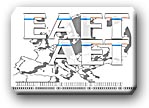Conférence
pour une
infrastructure
terminologique en Europe
Conferencia para una infraestructura terminol�gica en Europa
Conference
for a terminology
infrastructure in Europe
Paris,
13-14-15/03/2000
Maison de l'UNESCO, Salle XI
7, place de Fontenoy
75007 PARIS
|
.Åsa
Holmér - Katri Seppälä
.
|
Harmonization between disparate languages, is that possible
at all?
The EFCOT experience
The situation is the same - English computer terms are used in Sweden, Finland and Greece. But the languages are different. Still, could we be of mutual benefit for each other when harmonizing concepts, in computer terminology in particular?
Since January 1999 four countries (Sweden, Finland, Greece and Norway) are involved in the EFCOT part of the WebIT/EFCOT-project within the MLIS-programme (Multilingual Information Society), run by the European Commission's DG XIII. This project follows the working methods of the Joint Group for Swedish Computer Terminology, JOGSCOT. The JOGSCOT way of working has proved to be successful, due to, among other things, a broad composition of the participants in the group, the use of electronic communication means and the existence of a web site where the recommendations are published.
The EFCOT project has the following main objectives:
· to implement the JOGSCOT model according to national prerequisites in Finland, Greece and Norway
· to try to harmonize concepts in computer terminology by using a discussion forum.
In this paper we would like to discuss in what way it has been possible so far to fulfil these objectives. We would like to describe what the challenges are when you are aiming to implement a model which was "founded" in Sweden to meet Swedish conditions in other countries and for other languages. Do the different starting-points affect the work? How do the differences in culture, language planning, etc. influence the progress of the project in the countries involved?
More specifically we also want to describe harmonization between languages as disparate as e.g. Finnish and Swedish: Is that possible at all? Yes, by using the very thing you want to avoid: the "lingua anglosaxa". With examples we intend to show how we have been able to coordinate and help each other in describing the concepts but also in coining expressions in the different languages.

